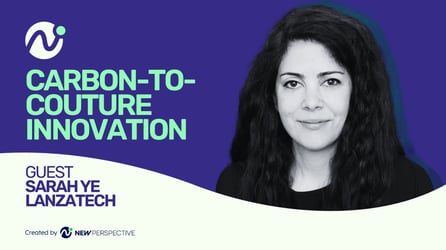Why Marketing Is Crucial For Climate Tech Success
In this episode, we chat with Gaël Gobaille-Shaw, CTO at Mission Zero Technologies, about his journey from electrochemistry research to co-founding a cutting-edge carbon capture startup.
Gaël shares the inspiration behind Mission Zero’s unique two-step carbon capture process, which mimics biology to absorb CO2 in liquid and separate it using a special membrane.
Learn how this innovative approach makes the tech more energy-efficient and scalable compared to traditional methods. We also explore the challenges of scaling carbon capture, the importance of adaptation in tech development, and why marketing plays a critical role in the growth of climate tech.
🎥 Guest: Gaël Gobaille-Shaw, CTO at Mission Zero Technologies
📝 Full episode transcript
Hi, Gaël, and welcome to the Green New Perspective Spotlight.
So can you share a bit about your background and what inspired you to start Mission Zero Tech?
Sure. My background is the chemist.
I did my university degree in electric chemistry.
I was fascinated by the way that carbon dioxide has the potential to be transformed into different types of chemicals.
I love the idea of looking at research that could find ways of transitioning humanities dependence away from fossil fuels.
So I did both my masters, my PhD in CO2 conversion.
That was basically the beginning of my G&E to carbon capture. It was after my PhD that I joined a venture building with deep science ventures.
And there they gave me the chance to understand and learn how to build a company and define what that company should be.
And it was there that I was really interested in moving students to, but it was a deep science venture that I realized actually the bigger problem is how we kept students to the first place.
And so that basically is probably the right tool needs for Mission Zero.
And can you tell me a bit more about your technology, how does it operate, and how does it contribute to mitigating global war?
The inspiration for this technology actually came from looking at the way biology handles carbon dioxide.
CO2 has the special ability among all the gases in the air to react with water and an alkaline solution to form carbonated by carbonate.
And from there we saw there were lots of different technologies that could manage the movement of these ions similar ways.
At least in analogy to the way that the body moves CO2 with muscles and respires it from the lungs. So our technology begins with what we call the air contactor, which is a big box where there is a shower of liquid being sprayed across all these high surface air materials.
And then at the same time air is being flown through this contactor.
And the carbon dioxide from the air dissolves and is absorbed by the liquid.
That liquid, which is now rich in CO2, is then transferred to another stage.
And in that stage those carbonate and bicarbonate ions are moved across a membrane into another liquid where it is unstable as carbonate and bicarbonate.
And immediately decomposes back into gas and the great part of this process will be an important part of this membrane is that it will only move those carbonate and bicarbonate ions.
And so you are able to produce pure CO2 out of this second stage.
And both of these stages happen concurrently.
So we have at the same time, so on one hand we are continuously moving air, continuously absorbing CO2. And on the other side of the process we are continuously producing pure stream of carbon dioxide.
And did you have any challenges while developing the tech and placing it on the market?
The concept originally was about carbonate and bicarbonates. And in our first year we tested many different ways of doing it.
And so I was there in the lab prototyping and trying different types of chemistry.
And we made lots of pivots in that first year because we started from just a base of concepts.
And so we had to prove which ones were the most viable.
And even halfway through a major project that we had gained government funding for, again I decided to make a shift in our pilot plant design made stage because I realized if we made the shift now, it might have been painful in the first couple of months but it was going to be much better for the ultimate pilot plant that we were designing at the time.
So lots of challenges are allowed because there are so many different components to test and at the beginning you don't know which are more sensitive to impacts on the performance of the technology.
So one of the big challenges is just managing all the trade-offs. Is it better to increase your concentrations of solar? Is it better to run it with this amount of energy or that amount of energy?
The whole supply chain to navigate as well. We've made a technology where everything that is in the plant, you can buy from a number of different vendors around the world.
But then the question comes to which do you select? And so we've had to test dozens of different vendors with different membranes and finding out which are most compatible with our process.
And that's been quite a journey because you have to build up a lot of knowledge before you can make a good decision.
And so that involves weeks and weeks of testing for things to come.
And since we are marketing agents you have to ask a marketing question. So has marketing played a role in introducing your tech and positioning yourself in this highly competitive market?
So massively one of the most important highs we've made is marketing and branding these in the company and at the time some engineers in the company might have said something like, don't we just need more engineers?
But marketing your products is as important as designing the product itself. And so making sure that we're communicating to not just the familiar audiences but the last familiar audiences to DAC is really important and positioning ourselves spreading what we've learned as many people as possible.
Because DAC is a growing field. We can, we're kind of like fish and sea in DAC and we don't appreciate how niches really still is.
It feels like it's such a big thing but you go out and speak to journalists and there's so many people who still need to be informed and to learn about this space for it to gain credibility and earn its rightful places part of our toolkit of solutions to worse climate change.
Yeah, I have to say I was surprised I read it today only didn't I think and I was surprised to read that one of the most wanted positions in the climate, tech space is the marketing position, marketing managers sales things like that.
I have to say I was surprised because I didn't, I didn't expect that I know how in a clean tech space everyone is like you said focusing on engineering part of the job and less on the marketing side, but I guess there's a shift.
Marketing is getting more and more competitive and well you need more from the marketing space to sell your products. Well, so this is a short conversation.
Can you tell me where people can find you learn more about mission zero and your tech and well reach out if they want to collaborate with you.
Our website is mission zero dot tech t e c h you'll find links to all the articles that we write on there as well as descriptions of our projects and story.
On LinkedIn we also emphasize everything that we're doing and writing about so you can find some links in.
We also have the Twitter accounts. Yeah, and of course just reach out to me or anyone this senior leadership team so my name is Guile T A E L and mission zero dot tech and my co founder is shill and nick.
I have a better email addresses that way. So yeah, we're always really interested to people reach out from different commercial displays, tech, technical, company, looking at different conferences, thing about policy.
We really welcome anyone to reach out if they have something to be like to work on or share often.
Thank you for watching Green New Perspective Spotlight series. If you would like a content please consider subscribing to our social media channel and follow our podcast on your favorite streaming platforms. Thanks!
📚 Episode resources and links
-
Website: https://www.missionzero.tech/
🎧 Subscribe to our podcast
💬 Follow GNP on Social



